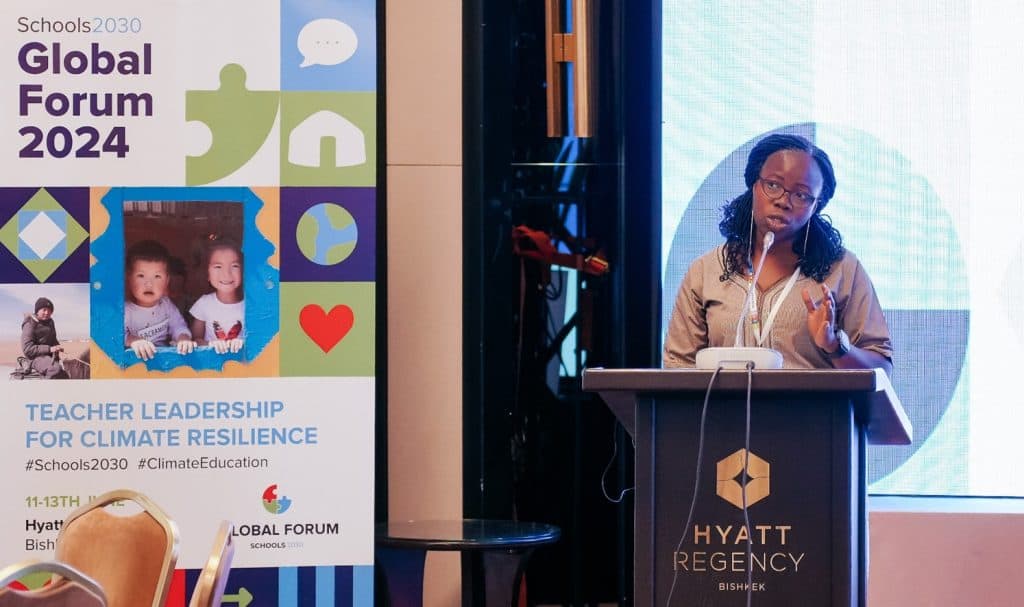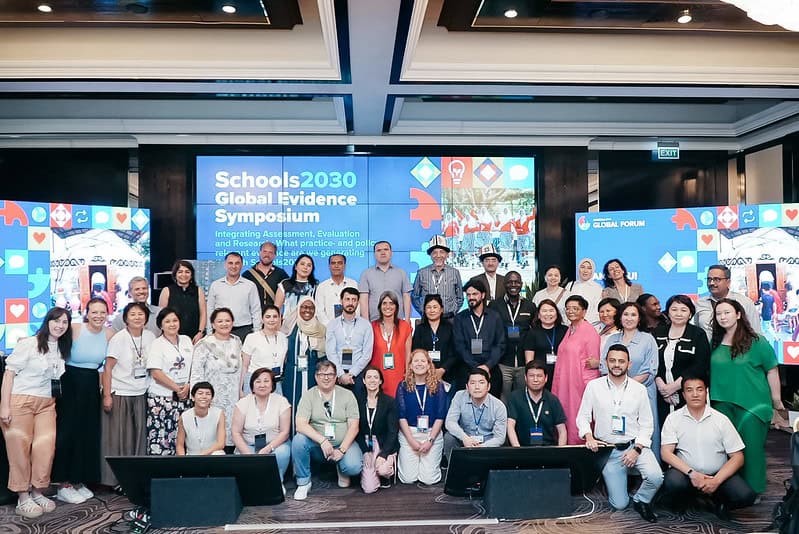How do you begin to process the wealth and complexity of learning and evidence generated by the Schools2030 teams and partners over the past three years? This was the ambitious yet exciting task ahead of delegates at the inaugural Schools2030 Global Evidence Symposium held in Bishkek, Kyrgyz Republic, in June. As a programme very much focused on action, the event provided a valued space for critical reflection on what we have learnt so far at Schools2030, how we might integrate this learning and how we should move forward to ensure we are having the greatest impact possible.
The symposium was held as a post-event to the third annual Schools2030 Global Forum, and represents the first time we have brought together so many members across our community at an in-person convening with the explicit purpose of delving deeply into the Schools2030 evidence base. We were delighted to bring members from all ten of our national programme teams together with the Schools2030 Impact Evaluation Partner, representatives from our Research, Assessment and Learning Partners at the global and national levels, as well as with teachers, donors and guests from local Kyrgyz universities and institutes.
10 Country teams
1 Global evaluation partner
3 Global assessment partners
10 National assessment partners
10 Learning partners
9 Global research partners
1000s of teachers
The day started with Schools2030 Impact Evaluation Partner Khulisa presenting data collected through the baseline study of the programme. The purpose of the baseline study was to collect data on learner assessments, principal and teacher experiences of Schools2030 and the impact and reach of the programme on the education sector in each country, in order to test our Theory of Change and use this data to strengthen the programme delivery. Given the complexity of the programme, designing an evaluation that establishes a counterfactual that will enable Schools2030 to infer impact in Schools2030 schools at the mid-line and end-line has been extremely challenging. With the programme having already started at the time of gathering data, the baseline study gives a point in time assessment of learning levels and teacher perceptions. Sharing the results for the first time was a useful exercise to understand how to frame the scope of our evaluation and its limitations, and gave country teams a much anticipated first look at the data. Further discussions will be held with country teams to validate the findings, and the baseline evaluation report will be shared externally by October 2024.
We then moved to consider the first of two key topics for Schools2030: Data feedback loops to improve teacher practice. In our programme model, the Human Centred Design (HCD) process is informed by assessment evidence gathered by teachers on their students’ learning outcomes and the quality of the learning environment. Whilst Phase 1 of the programme has focused a lot on tool development, during Phase 2 we will seek to strengthen the implementation and impact of our assessment tools, which includes enhancing teacher support and better integration of assessment data into the HCD cycle. During this session we heard presentations from Schools2030 Global Assessment Partners ECD Measure and Oxford MeasurEd who are leading this work, as well as Eklavya Foundation who leads Schools2030 assessment work in India. Research partner Right to Play also spoke through their approach to data feedback to teachers through co-created tools and by building peer learning environments. Overall, speakers heeded caution against the data overload that can often lead to data paralysis for teachers, acknowledging that “what gets measures is what gets done”. Nevertheless, beyond gathering data through measurement tools, teachers can only act on this if data is understood and is useful. Engaging discussion amongst participants suggested there is still more work for Schools2030 to do on training teachers and working with schools and systems to embed holistic learning assessment processes to ensure a data driven teacher workforce is behind efforts to improve holistic outcomes for learners.


The second thematic session focused on equity and inclusion, exploring how dimensions of exclusion play out in different contexts and how Schools2030 is addressing this at different levels. We first had a presentation from Aga Khan University’s Institute for Educational Development, Pakistan that reiterated the challenges of working in contexts such as remote Pakistan where deeply rooted inequality is driven by poverty, but that addressing this through education is one way of changing mindsets. Research partners Open Development & Education and the University of São Paulo spoke to this through their presentations describing how they have been seeking to better understand the linkages between action research, holistic skills development and equity.
In Uganda, Open Development & Education have been co-developing a teacher toolkit to support teachers foster warmer relations with students with disabilities to improve outcomes for all learners based on their research findings indicating that warmer teacher-student relationships lead to improved holistic learning outcomes. Teacher Grace Zanvacia from Mvara Secondary School in Uganda brought this to life by describing her experience using HCD to design inclusive mathematical innovations. Her Cartesian board innovation which was modelled in Bishkek is used to teach 8 concepts in maths and is concurrently enabling learners with disabilities to interact meaningfully with other children, promoting better relationships in the classroom.

With the limited literature on action research used in schools and its relation to equity, the research in Brazil led by the University of São Paulo constitutes novel findings on how action research in the context of Schools2030 is impacting on different social markers of diversity, including students with disabilities, and those of different ethnicities, genders and sexual orientation. This session was closed by Professor João Costa, former Minister of Education in Portugal and currently President of the Educational Policy Committee of the OECD, who concluded that translating what we know about inclusion into practice, and moving beyond policies to be able to affect mindset shift can be challenging. He offered an important reminder to maintain the standard of true inclusion rather than merely integration of learners within a system, highlighting the need to protect innovative teachers that are bringing about change in the system to benefit all learners.
In the afternoon, participants split into regional groups based on where they are working to discuss the evidence shared from the baseline evaluation study, the research, assessment and learning partners, and also from programme colleagues, and think about the relevance of these findings in their context for policy and for practice. These sessions proved a valuable opportunity for the cross section of participants to discuss several topics ranging from design team composition, how we might integrate the feedback of research findings through the HCD process, the role of school leadership and parental engagement in securing the sustainability of the programme model, and how we might work more closely with initial teacher education institutes to scale HCD.

Building on these discussions, the last session of the symposium was dedicated to co-creating and refining key questions around themes and evidence gaps that emerged throughout the day which included teacher professional development; teacher leadership; policy and system change; mindset shifts and enabling conditions for scale. This was a worthwhile exercise for Schools2030 to conduct to understand the questions our community would like us to answer moving forward. As a movement comprised of teachers, researchers, implementers and government partners, Simon Sommer, Co-CEO at the Jacobs Foundation, pointed out that Schools2030 is uniquely positioned to answer many of these questions with great potential to bridge the gap between rigorous evidence and practice.
Finally, Professor João Costa offered closing remarks that pushed us to continue to hold more of these spaces for criticality and to bring in voices that challenge our beliefs. Concluding a day where many sources of evidence had been presented, he reminded us of the importance of crafting a focused and compelling narrative to communicate the Schools2030 evidence so that this may reach its intended audiences. We are extremely grateful for the energetic engagement we received from across our community during the symposium – especially as this was held after a busy Global Forum! It comes second nature to Schools2030 to continue to adapt and iterate, and this is what we will continue to do following the rich exchange of discussion and questioning comments that arose from our first Schools2030 Evidence Symposium.
Find out more about our projects on the Schools2030 Research page.
